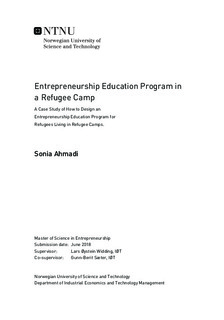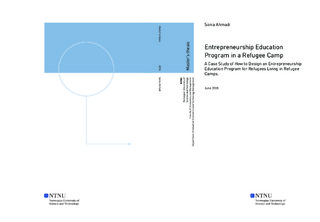| dc.description.abstract | Entrepreneurship can be considered as a part of the solution to the problems of millions of forcibly displaced refugees who live in the refugee camps and face the problems of unemployment an poverty. Current literature lack in-depth studies on entrepreneurship education in a refugee camp, which underlines a need for an empirical research in this area. The purpose of thesis is to investigate how to design an entrepreneurship education program that benefits refugees. Two research questions are designed to fulfill this purpose, where the most suitable type of education for refugees and the most important factors for the design of such a program have been investigated. To answer these questions, a literature review and a qualitative research based on twelve semi-structured interviews with experts within four relevant areas of expertise are conducted. Based on this, a conceptual framework for the design of an entrepreneurship education program for refugees is being proposed.
Empirical findings show that entrepreneurship education program with a focus on business
ownership and self-employment might be suitable for refugee. However, entrepreneurship
education in general is assumed to improve their situation by enabling them to become problem
solvers and change agents in their communities. Findings also suggest that one of the most
important factors for design of a program for refugees is: adapting to the social and cultural context, but keeping the foundation of the entrepreneurship education intact. Another important factor is involving the refugees in the process of the design of the program to create a sense of ownership, which in turn is important for the acceptance and viability of the program. The important factors are divided into individual and societal levels and are discussed in detail. Main contribution of this thesis is to pinpoint the importance of entrepreneurship education in a refugee context. This thesis has also proposed a conceptual framework based on the literature review and empirical findings for design of an education program in entrepreneurship for refugees, which can be used by different institutions as a starting point. Moreover, a list of five various types of entrepreneurship education that are considered to be suitable for refugees are presented. | |

